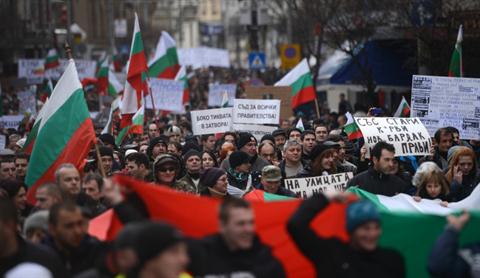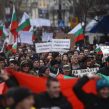
Bulgaria’s President Struggles to Form New Government
Publication: Eurasia Daily Monitor Volume: 10 Issue: 44
By:

The political crisis in Bulgaria is deepening as the street protests continue despite the surprising resignation of the government on February 20. The wave of protests has spread to over 25 cities; in Sofia the demonstrators have set up a tent camp in front of the presidential administration building. What started as rallies against high electricity bills turned into outrage against the political class and corrupt officials, blamed for the crony economy and growing poverty.
The death from self-immolation of Plamen Goranov on March 3 further ignited the demonstrations. The 36-year-old photographer from the Black Sea city of Varna, who was quickly named the “Bulgarian Jan Palah,” set himself on fire on February 20 in a protest against the city’s corrupt authorities and their mafia-style connections to the shady TIM business group, which allegedly controls Varna. After days of rallies against his government, four-term Varna mayor Kiril Yordanov finally resigned on March 6. In the meantime, two more people are in critical condition after setting themselves ablaze out of desperation over their poverty (bivol.bg, February 22; BTA, March 4; BNT, bTV, March 6).
Bulgarian President Rosen Plevneliev, who is the only legitimate authority in the country at the moment, offered a mandate to form a new government to each of the three major political parties, but they turned it down. Neither the ruling Citizens for European Development of Bulgaria (GERB), nor the opposition Socialist Party, nor the Movement for Rights and Freedoms (MRF—the Turkish party) want to deal with the critical situation; instead, the parties are already preparing for snap elections. The president is expected to dissolve the parliament on March 13, appoint a caretaker government and schedule parliamentary elections on May 12. “We have a social crisis that has escalated into a political crisis with the resignation of the Borisov government. The crisis, however, is now parliamentary, because there is no option of forming a government,” said Plevneliev after meeting with the European Council President Herman Van Rompuy in Brussels on March 6 (24 Chasa, March 6; economy.bg, March 7).
The president is indeed alone in his efforts to contain the crisis and appoint a government. Capital Daily wrote on March 6: “Potential ministers, prime ministers and the president himself are vilified and bespattered one after another to the point of discredit. Notably, the public attacks—often unfounded, but skillfully striking a chord with the protestors—have a single spearhead, and this is the media monopoly of MRF parliamentarian Delyan Peevski and banker Tsvetan Vassilev.” Outgoing Prime Minister Boyko Borisov has long used as his publicity tool the media empire controlled by Peevski and financed by the Corporate Commercial Bank of Vassilev.
The protestors’ core demands are for government accountability and civil society oversight of governmental institutions. However, these demands are formulated through irrational and even dangerous requests, such as abolishing all political parties and electing a parliament of non-partisan citizens through preferential citizen’s electoral lists. Populism is combined with nationalist and anti-foreign investment sentiments, which threaten to scare future investors from the poorest European Union economy. This sentiment is particularly strong against the Czech companies CEZ and Energo Pro as well as the Austrian EVN, which operate the energy distribution network in Bulgaria and took the blame for this winter’s high energy bills. The protestors insist on a re-nationalization of the electricity distribution companies and revoking the licenses of the three foreign companies. Bulgaria’s Chief Prosecutor began an investigation of the companies by sending gendarmerie officers to storm the premises of CEZ in Sofia (novinite.com, 24 Chasa, February 27). But the Bulgarian parliament turned down a proposal by the nationalist Ataka party for a mandatory suspension of the licenses of CEZ, EVN and Energo Pro, along with their nationalization (novinite.com, March 6).
Speaking before the parliament on February 28, President Plevneliev said that the next assembly would have to focus on adopting anti-trust laws, restructuring the energy sector, and liberalizing the electricity market according to EU rules (BTA, February 28). Newly adopted amendments to Bulgaria’s Energy Act allowed electricity prices to decrease by seven percent from March 5 (novinite.com, February 28; Dnevnik, March 5). A previous decision of the outgoing government to restrict access to the national grid for more expensive energy producers, such as the thermo-power plants AES Maritza East 1 and Contour Global Maritza East 2, operated by United States companies, sparked immediate protests by coal miners (BNT, March 5).
The outgoing Bulgarian parliament is scrambling to adopt last-minute decisions before being dissolved for early elections. On March 6, the parliament confirmed a government decision to pull out of the Russian-led Burgas-Alexandroupolis oil pipeline project. The Borisov government had decided in 2011 to withdraw from the 175-mile pipeline project intended to transfer Russian oil to Greece via Bulgaria (BTA, March 6).
Following a referendum in January on the construction of a new nuclear power plant, the parliament also adopted a decision to abandon plans for a new Russian-built Belene nuclear power plant on the Danube River. The voter turnout was slightly over 20 percent, not enough to deem the plebiscite valid. Under the law, the referendum results directed the parliament to make final a decision within three months (see EDM, February 5).
Russian nuclear energy company Rosatom, however, has not given up on the project. Its spokesperson, Sergey Novikov, told Bulgarian National Radio that the parliamentary vote does not finally terminate the power plant’s construction. He suggested that Bulgaria’s new government might decide to revive the Belene nuclear power plant. Similar suggestions were made by Socialist Party leader Sergey Stanishev (ITAR-TASS, February 21; novinite.com, February 27; BNR, February 28).
Despite overall fiscal stability and a prognosis for moderate economic growth, the current economic crisis has already prompted businesses to postpone their investment plans. While forecasts envisage short-term instability, Bulgarian economist Peter Chobanov says that the country will face a second recession this year, which will demonstrate itself in foreign trade, consumer spending and investment. Indeed, consumer spending has been steadily declining in the last five months: in January it was down by 5.5 percent compared to the same month last year (Capital Daily, March 7).




